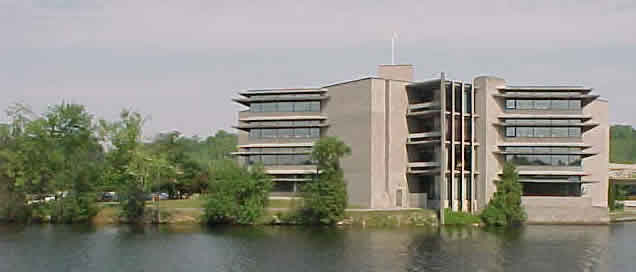Bata Transformation: Library of the Future
Trent University’s iconic Bata Library re-opened on October 29, 2018 after an amazing revitalization and transformation.
Fueled by a recent $8.1 million funding injection from the federal and provincial governments, as well as University contributions which included donor gifts, the Bata Library underwent an $18 million transformation into a library of the future – and home to the new Bata Research and Innovation Cluster.
Recognizing our library’s place as the academic heart of the University, the revitalization of the library has ensured Trent’s digital and physical collections are preserved, while at the same time, improving access to the world’s knowledge, and ensuring our library services respond to the rapidly changing needs of students and faculty.
See details on the transformation.

Photo by Louis Taylor.
Welcome to the Bata Library
The Bata Library is the only library at the Peterborough campus. In Fall 2010, a new branch library opened in Oshawa: see information about the Durham Campus Library.
Construction of the Bata Library began in 1967 and it was officially opened by Thomas J. Bata on September 6, 1969. This beautiful building is the centrepiece of the university campus and reflects in large measure the vision and philosophy of its architect, Ron Thom (1923-1986). While the campus was to be decentralized and comprised of a number of discrete colleges, the library was situated so as to form the focal point, the intellectual heart of the university. Members of the architect's planning team visited libraries at Brandeis, Yale, Harvard and M.I.T. before designing this beautiful Modernist building. The walls of Bata are exposed-aggregate rubble and concrete which Thom saw as matching closely the stone outcroppings of the area.
A good book on this is Trent: The Making of a University by A.O.C. Cole (Trent University, 1992). We have several copies of this book in the library.
Our Collection
The online Library catalogue provides access to most of the collection. The Library’s collection includes:
- more than 250,000 printed volumes,
- over 500,000 e-books,
- a microforms collection,
- current print serials subscriptions,
- 30,000 electronic serials (e-journals),
- over 150 online databases,
- 87,000 maps,
- 24,500 air photos,
- 243,273 government publications, and
- a wide range of data resources.
Most print material is available in open stacks. Online resources are organized by subject, by type, and by title.
The Library houses a number of special collections to support the University’s interest in Canadian Studies. These include the G. M. Douglas Arctic Collection, the Floyd Chalmers Collection of Canadian Explorations and the A. J. M. Smith Collection of Canadian poetry and literature. Transcripts of the Royal Commission on the Economic Union and Development Prospects for Canada (MacDonald Commission) and those of the Mackenzie Valley Pipeline Inquiry are also available.
Trent University Archives holds non-current records of the University and also functions as a regional archive preserving private historical records of Peterborough County and the surrounding area. Holdings comprise over 1,100 metres of textual records – family, business, association and institutional papers – as well as 38,000 photographs, maps and other graphic items. In addition, a number of special collections of published materials have been acquired which focus on rare Canadiana. The Archives website provides an overview of the department and policies as well as in-depth guides to the holdings.
The Maps, Data & Government Information Centre (MaDGIC) is a major resource for all students. The department serves as a regional depository for several governments including the federal Government of Canada and provincial Government of Ontario. Collections include:
- Canadian parliamentary and legislative papers,
- statutes and regulations and other Canadian legal tools,
- Statistics Canada collections,
- royal commissions and task force reports,
- technical reports and studies
- as well as a range of cartographic resources including Canadian and international gazetteers and atlases, topographic maps, theme maps, Ontario Base Maps, and aerial statistical digital information as well as related technical support.
Introductory and specialized workshops to general resources, research techniques, and MaDGIC collections are offered by qualified Librarians.
Further Links
- Link to Directions to Trent University
- Link to a map of the Trent University campus in Peterborough - the Bata Library is on the West Bank of Symons Campus.
- Link to Parking Services - parking is available directly in front of the library building, using a pay-and-display machine. Parking fee information and a map of parking lots at the Symons Campus are both available at the Parking Services link.
- Link to Bata Library Hours
- Contact Us



